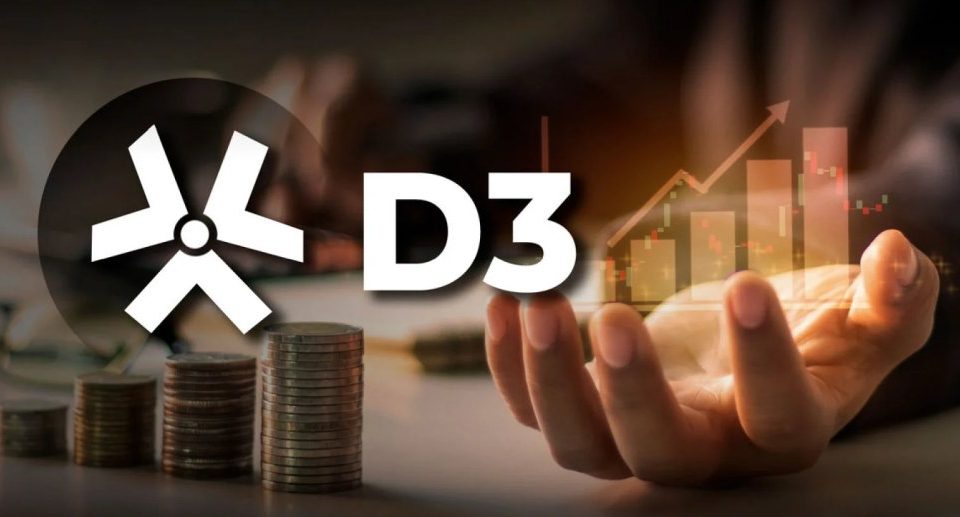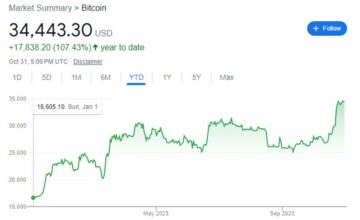
Welcome to the first edition of our Founder Stories series! Launched last month, Founder Stories showcases interviews with real founders and entrepreneurs, as well as discussions with executives shaping the future of technology and making global impacts.
Today, we have the pleasure of talking with Fred Hsu, the founder and CEO of D3. D3 is a pioneering Web3 startup, leading the evolution of domain names into the next generation. D3 is bringing Web3 Top Level Domains (TLDs) and secure, decentralized identities to the heart of the internet—the Domain Name System (DNS).
Fred Hsu is a seasoned entrepreneur and angel investor deeply involved in the Web3 space. Before launching D3, he played key roles in several successful ventures. As co-founder and CEO of Manage.com, he contributed to its acquisition by Criteo. Earlier, he served as co-founder and CTO at Oversee.net, which was acquired by Oak Hill Capital Partners following a remarkable $150 million Series A funding round. Fred is an alumnus of the University of California, Los Angeles.
Thank you, Fred, for joining us to delve into the world of Web3 domains.
Can you please start by sharing some of your background in the Web2 domain area, and how it’s influenced your leadership of D3?
Thanks for having me. I have been active in the domain industry since the 2000s and patented domain monetization (parking), owned and operated domain aftermarket, auctions and drop-catching services, traffic marketplaces, and even domain conferences (DomainFest). I was a co-founder at Oversee.net where I was CTO, Manage.com (Criteo) and Ember Entertainment (Gala), and over the years have managed domain portfolios consisting of millions of domains and over 200 million unique visitors per month. Together with my co-founders, Shayan Rostam and Paul Stahura, we have over four decades of domain and DNS-specific expertise that we are using to bring real domains to Web3.
What would you say is the core problem facing Web2 domains today for those holding potentially valuable addresses?
A common misconception is that there are Web2 and Web3 domains. This is not the case. There are domains that are issued and integrated with the domain name system (DNS) and then there are alt-DNS domains, which some refer to as Web3 domains, but it’s limited to blockchain interactions, graphics and vanity, wallet addresses, and with no native DNS integration or support. Type these Web3 names like FRED.ETH into a browser or try sending an email to it and you’re set up for disappointment.
Currently, one of the biggest problems facing real domains is the secondary trading market which is difficult to navigate and still stuck in the past. I still get email offers to this very day for my .AI and .COM portfolio. This frustrated and continues to frustrate me to no end. The vast majority of traditional .com, and more recently .ai, domain sales are unreported private party transactions into the hundreds of millions of dollars per year. Our plans to offer domain tokenization will allow domain owners access to a much more efficient ecosystem that will allow instant transfers and instant settlement, more liquidity and a user interface that puts accessibility and usability at the forefront.
Can you briefly discuss the concept of domain liquidity and how tokenization can create this for owners? What other models do we have that also utilize the tokenization of real-world assets to create liquidity?
Sure, liquidity basically refers to the ‘sellability’ of an asset, in this case, domains. If it has good liquidity it can be bought and sold with ease, and illiquidity or poor liquidity means it will struggle to sell with very wide spreads between bid and ask. For reference, there are over 350 million domains registered worldwide, and yet over half of those are either not in use or were registered purely as investments. With millions of domains expiring per year, many are literally snapped up by individuals, institutions, even a network of registrars. The current secondary market for domains is quite fragmented, slow, opaque at best, filled with bottlenecks, and liquidity is limited to certain marketplaces, keywords, and audiences. When CHAT.COM sold for $10m, who even knew it was for sale? Certainly not me.
By tokenizing these assets, we’re making them more liquid and we’re putting them front and center within our network of traditional brands and enterprises, domain or “domainer” OGs (individuals and institutions), traders and Web3 degens alike. Accessibility, scalability, and speed are priorities and unique features that blockchain technology and tokenization will bring to the table. Why wait a week or even two to complete a transaction when you can do it nearly instantly?
Real estate, financial instruments, and precious metals have seen a massive increase in interest for tokenization. The tokenized real estate market alone is already worth somewhere around $200 million, and real estate has traditionally been relatively liquid, so even there is clearly an appetite for everything RWA.
Note: This is an interesting piece to read for context: https://cointelegraph.com/news/token-adoption-real-world-assets-blockchain
You’ve stated before that the key to creating new top-level domains for Web3 is through ICANN approval. What strategy should D3 and others use to make this happen?
There has only been one application window for new top-level domains in the last 40 years and that was in 2012. Our team has decades of combined experience in domain management including applying for new TLDs in 2012 as well as launching and managing a host of TLDs such as .xyz, .tv, .game, and more. We’re taking this expertise and offering projects within the Web3 ecosystem the opportunity to pursue their own dedicated TLDs, which will eventually offer their users real domains and the best of the Internet and Web3.
How has ICANN reacted to D3’s efforts in creating Web3 domains?
No comment. (None received, not making any, yet.)
Shiba Inu is working with D3 to create an authorized “.shib” top-level domain. Are there any major hurdles at this point, and how do you plan to resolve them?
There is a lack of understanding within the Web3 industry over what a real domain is. There is an abundance of alt-DNS domain services in Web3 that not only pose significant risks to their users but also to the wider ecosystem. We’re working with our partners to educate their communities, which in turn should have a ripple effect within the market educating users on real vs alt-DNS domains and the benefits offered by the DNS.
There have been other groups working to create top-level domains without the approval of ICANN. Do you think there is a risk that these efforts will create a reputation problem for legitimate Web3 domains?
The problem is less about reputation and more about the risks to users. They’re being promised ‘domains’ without the functionality of native DNS. They are oftentimes nothing more than glorified Jpegs, and vanity wallet addresses and despite eschewing the ethos of decentralization, they open up users to a myriad of potential risks such as name collisions and obsolescence; exposure to potentially malicious smart contracts; limited integrations, and no backward compatibility with critical web infrastructure.
Do you think that corporations with their domain names would have an interest in raising liquidity through tokenization? Have you received any feedback from companies about this?
We’ve spoken to many stakeholders who have expressed excitement about our plans for domain tokenization. I can’t reveal too much at this time, but we’re going to let the product speak for itself and we’re focused on delivering a truly unique user experience.
Assuming ICANN works with the Web3 community on new domains, do you think there is a risk of over-saturation in the space if every blockchain wants its own customized top-level domain?
Not at all. These communities have massive, loyal user bases centered around their brand identity. There is a noticeable difference in identity-specific use cases between the Internet and Web3. On the Internet, the average consumer doesn’t really need a domain, but in Web3 a unique digital identity solves so many issues, from replacing complex wallet addresses to protecting users from scams such as address poisoning, clipboard hijacking and of course just plain user error.
Do you think D3’s efforts at domain tokenization can flow backward to Web2? How do you see domain tokenization working?
Although I won’t reveal too much about our plans, I believe that we will set a standard for domain tokenization. None of the leading domain registrars have publicly expressed interest in or plans for tokenization, but we see a lot of potential in the market and believe that they will jump on board once the value proposition, critical mass, and our solution become more apparent.
- SEO Powered Content & PR Distribution. Get Amplified Today.
- PlatoData.Network Vertical Generative Ai. Empower Yourself. Access Here.
- PlatoAiStream. Web3 Intelligence. Knowledge Amplified. Access Here.
- PlatoESG. Carbon, CleanTech, Energy, Environment, Solar, Waste Management. Access Here.
- PlatoHealth. Biotech and Clinical Trials Intelligence. Access Here.
- Source: https://techstartups.com/2024/02/06/founder-story-interview-with-fred-hsu-co-founder-and-ceo-of-d3-on-web3-domains/
- :has
- :is
- :not
- :where
- $UP
- 200
- 2000s
- 2012
- 350
- 40
- a
- About
- abundance
- access
- accessibility
- acquired
- acquisition
- active
- address
- addresses
- AI
- alike
- All
- allow
- alone
- already
- also
- alumnus
- an
- and
- Angel
- Angel Investor
- Angeles
- any
- apparent
- appetite
- Application
- Applying
- approval
- ARE
- AREA
- around
- AS
- ask
- asset
- Assets
- At
- Auctions
- audiences
- authorized
- average
- background
- Basically
- BE
- become
- been
- before
- being
- believe
- benefits
- BEST
- between
- bid
- Biggest
- blockchain
- blockchain technology
- board
- bottlenecks
- bought
- brand
- brands
- briefly
- bring
- Bringing
- browser
- but
- by
- california
- CAN
- capital
- case
- cases
- Center
- centered
- ceo
- certain
- certainly
- chat
- clearly
- Co-founder
- co-founders
- COM
- combined
- comment
- Common
- Communities
- community
- Companies
- compatibility
- complete
- complex
- concept
- conferences
- Consisting
- consumer
- context
- continues
- contracts
- contributed
- Core
- Corporations
- course
- create
- Creating
- critical
- CTO
- Current
- customized
- day
- decades
- Decentralization
- decentralized
- dedicated
- deeply
- degens
- delivering
- delve
- Despite
- difference
- difficult
- digital
- digital identity
- disappointment
- discuss
- discussions
- dns
- do
- Doesn’t
- dollars
- domain
- Domain Name
- DOMAIN NAMES
- domains
- Earlier
- ease
- ecosystem
- edition
- educate
- educating
- effect
- efficient
- efforts
- either
- end
- enterprises
- Entertainment
- Entrepreneur
- entrepreneurs
- error
- estate
- ETH
- Ethos
- Even
- eventually
- Every
- everything
- evolution
- Excitement
- executives
- experience
- expertise
- Exposure
- expressed
- facing
- Features
- feedback
- filled
- financial
- Financial Instruments
- First
- flow
- focused
- following
- For
- forefront
- founder
- Founder and CEO
- founders
- four
- fragmented
- from
- front
- frustrated
- functionality
- funding
- Funding Round
- future
- future of technology
- Gala
- game
- generation
- get
- Global
- going
- good
- graphics
- Group’s
- Half
- happen
- Have
- having
- he
- Heart
- holding
- host
- How
- HTTPS
- Hundreds
- hundreds of millions
- Hurdles
- i
- identities
- Identity
- if
- Impacts
- in
- Including
- Increase
- individuals
- industry
- influenced
- Infrastructure
- instant
- instant transfers
- instantly
- institutions
- instruments
- integrated
- integration
- integrations
- interactions
- interest
- interesting
- Interface
- Internet
- Interview
- Interviews
- into
- Inu
- Investments
- investor
- involved
- Issued
- issues
- IT
- ITS
- itself
- joining
- joining us
- JPEGs
- jpg
- jump
- just
- Key
- keywords
- Lack
- Last
- launched
- launching
- Leadership
- leading
- legitimate
- less
- let
- Level
- like
- Limited
- Liquid
- Liquidity
- los
- Los Angeles
- Lot
- loyal
- major
- Majority
- make
- Making
- malicious
- manage
- managed
- management
- managing
- many
- Market
- marketplaces
- Mass
- massive
- me
- means
- Metals
- million
- millions
- models
- monetization
- Month
- more
- more efficient
- much
- my
- myriad
- name
- names
- native
- Navigate
- nearly
- Need
- net
- network
- New
- next
- no
- None
- nothing
- noticeable
- oak
- of
- offer
- offered
- offering
- Offers
- oftentimes
- on
- once
- ONE
- only
- opaque
- open
- operated
- Opportunity
- or
- Other
- Others
- our
- over
- oversee
- own
- owned
- owners
- parking
- partners
- party
- past
- patented
- Paul
- per
- piece
- Pioneering
- Plain
- plan
- plans
- plato
- Plato Data Intelligence
- PlatoData
- played
- please
- pleasure
- Point
- poisoning
- poor
- portfolio
- portfolios
- pose
- potential
- potentially
- Precious
- Precious Metals
- private
- Problem
- problems
- Product
- projects
- promised
- proposition
- protecting
- publicly
- purely
- pursue
- Puts
- Putting
- quite
- raising
- Read
- real
- real estate
- real estate market
- real world
- really
- received
- recently
- refer
- reference
- refers
- registered
- relatively
- remarkable
- reputation
- resolve
- reveal
- Ripple
- Risk
- risks
- roles
- round
- rwa
- sale
- sales
- say
- Scalability
- scams
- seasoned
- secondary
- Secondary Market
- secure
- see
- seen
- sell
- sending
- Series
- Series A
- Series A funding
- Series A funding round
- served
- Services
- set
- settlement
- several
- shaping
- sharing
- should
- showcases
- significant
- since
- slow
- smart
- Smart Contracts
- So
- sold
- solution
- Solves
- some
- somewhere
- Space
- speak
- speed
- spoken
- Spreads
- stakeholders
- standard
- start
- startup
- stated
- Still
- Stories
- Story
- Strategy
- Struggle
- successful
- such
- support
- system
- table
- taking
- talking
- team
- Technology
- than
- that
- The
- The Future
- the world
- their
- Them
- then
- There.
- These
- they
- Think
- this
- those
- Through
- time
- TLDs
- to
- today
- together
- Tokenization
- tokenized
- Tokenized Real Estate
- tokenizing
- too
- top
- top-level
- top-level domain
- Traders
- Trading
- Trading Market
- traditional
- traditionally
- traffic
- transaction
- Transactions
- transfers
- truly
- try
- TURN
- tv
- two
- type
- understanding
- unique
- university
- University of California
- us
- usability
- use
- User
- User Experience
- User Interface
- users
- using
- utilize
- Valuable
- value
- VANITY
- Vast
- Ventures
- very
- visitors
- vs
- wait
- Wallet
- wants
- was
- we
- web
- Web2
- Web3
- Web3 community
- Web3 Ecosystem
- Web3 industry
- Web3 space
- week
- WELL
- were
- What
- when
- which
- WHO
- why
- wide
- wider
- will
- window
- with
- within
- without
- working
- works
- world
- worldwide
- worth
- would
- xyz
- year
- years
- yet
- you
- Your
- zephyrnet












